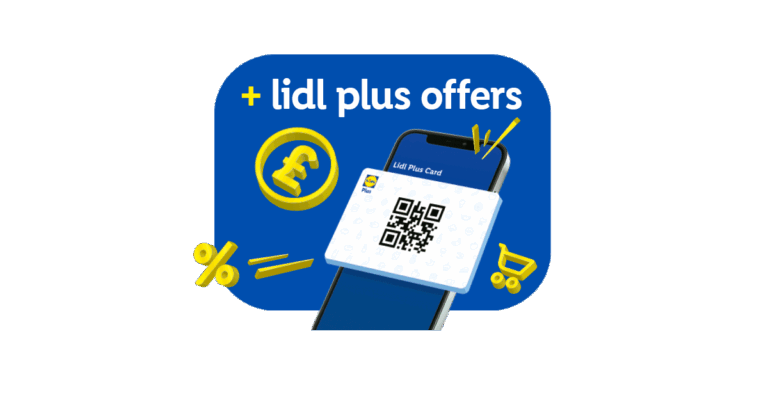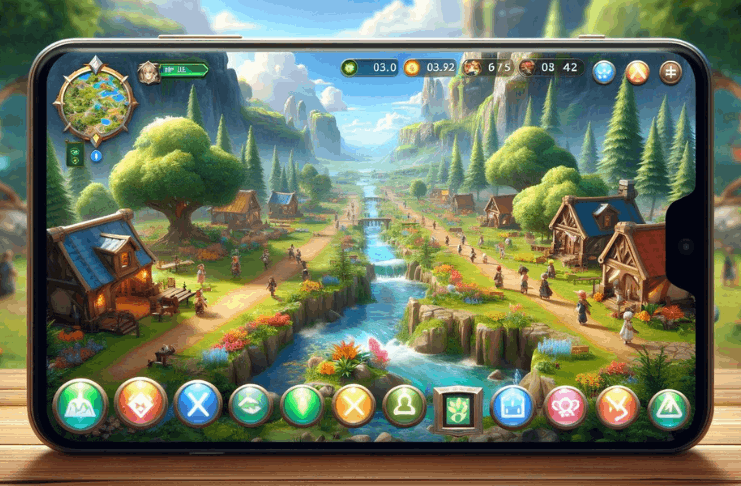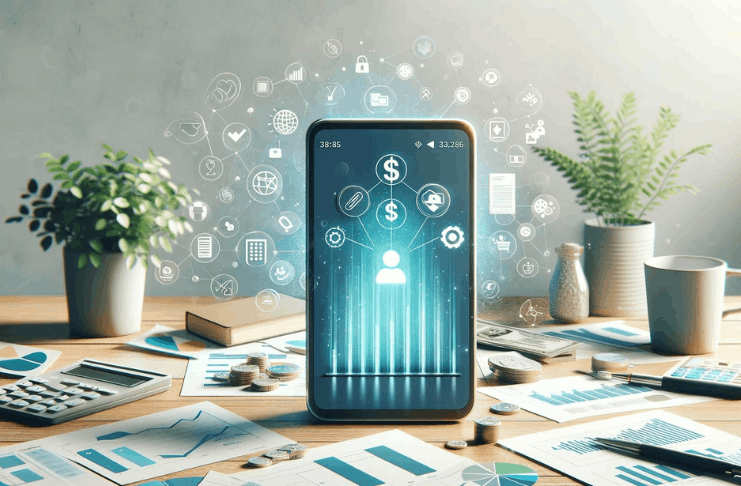Mobile health apps are transforming the healthcare landscape by offering convenient and personalized solutions for a wide range of health needs.
These apps offer telemedicine consultations and wellness tracking, providing easy access to health services and promoting better health outcomes.
As technology continues to evolve, the potential of mobile health apps to improve healthcare accessibility and efficiency is immense.
Mobile Apps
Mobile apps are prime examples of communication systems, coming in diverse forms to cater to different user needs.
In today’s world, it’s hard to imagine a day without smartphones, tablets, and their apps, including personal health records apps.
There’s an app for every need, providing solutions and information.
Healthcare Apps
The healthcare sector is no exception, with a plethora of apps offering services from wellness to doctor consultations and mental health support.
Users can access these apps anywhere, whether at home or on the go.
Promoting Health Awareness and Information Sharing
These apps are not just about health solutions; they’re also promoting health awareness among people.
Integrated with mHealth and electronic medical records (EMR), they can provide and share important health information.
During the COVID-19 pandemic, these apps were crucial in addressing various healthcare needs, and their importance is expected to continue even after the pandemic.
Mobile Health Apps: Types and Popular Choices
Mobile health apps are divided into categories based on their use.
These include Telemedicine apps, also known as Disease & Treatment Management apps, General Health & Wellness Management apps, and apps for managing your personal health record online.
Additionally, there’s a growing category called femtech, focused on women’s health, which is gaining popularity among female users.
Telemedicine Apps
Telemedicine apps allow users to connect with healthcare professionals for medical consultations via video, voice, or chat.
These platforms enable patients to book appointments and engage in virtual consultations with doctors, making healthcare more accessible and convenient.
Additionally, telemedicine apps facilitate the secure exchange of medical documents between patients and healthcare providers.
Some popular telemedicine apps are:
- VirtuMedix is a telemedicine platform that offers a user-friendly interface for virtual consultations, allowing patients to receive medical advice from the comfort of their homes.
- eVisit provides a comprehensive telemedicine solution that enables healthcare providers to deliver virtual care, streamlining the process of diagnosing and treating patients remotely.
- MDLIVE is a popular telemedicine service that offers 24/7 access to board-certified doctors and therapists for a wide range of medical and mental health issues.
- Lemonaid is known for its quick and affordable online consultations, focusing on providing prescriptions for common health conditions and offering a simple, hassle-free experience.
- LiveHealth Online is a telemedicine service that allows users to have video visits with doctors and psychologists, offering a convenient way to address non-emergency health concerns.
- PlushCare provides access to top doctors for virtual appointments, with a focus on primary care, mental health, and chronic condition management.
- Doctor on Demand offers video visits with healthcare professionals for a variety of medical issues, including urgent care, mental health, and preventive health.
- Amwell connects patients with doctors, specialists, and therapists for virtual visits, covering a wide range of medical concerns and offering 24/7 access to care.
- Talkspace is a telemedicine platform specializing in mental health, providing online therapy with licensed therapists for various emotional and psychological challenges.
- Teladoc is a leading provider of virtual healthcare services, offering access to doctors, dermatologists, and therapists for a variety of health concerns, with a focus on convenience and accessibility.
General Health & Wellness Management (Healthy Diet Apps or Mental Health Apps)
The growing awareness of personal health has led to a surge in demand for wellness apps, particularly among young people and working professionals.
These apps help users monitor their daily activities and manage chronic health conditions effectively while also keeping track of their patient health records for better healthcare management.
Some leading apps in health and wellness management are:
- Headspace is a meditation and mindfulness app that offers guided sessions to help users reduce stress, improve focus, and sleep better.
- Wellable is a wellness platform that provides tools and resources for individuals and organizations to promote healthy lifestyles and employee wellness.
- Noom is a weight loss app that uses psychology-based approaches to help users develop healthier eating habits and achieve their weight loss goals.
- Exhale is a mental wellness app designed for women of color, offering content and tools focused on mindfulness, meditation, and self-care.
- Meditopia is a meditation app that provides a wide range of guided meditations and sleep stories to help users find peace and relaxation.
- Fitness+ is a subscription-based service offering a variety of workout classes led by professional trainers designed to complement the Apple Watch experience.
- Power Nap App is designed to help users take short, restorative naps with guided relaxation techniques and alarm settings to wake up refreshed.
- Elevate is a brain training app that offers personalized cognitive exercises to improve focus, memory, and other mental skills.
Apps Targeting Women’s Health
Women’s healthcare apps, often categorized under femtech, are rapidly growing in popularity.
These applications provide valuable resources and information on a variety of topics, including pregnancy tracking, weight management, medication reminders, sleep cycle monitoring, and tracking menstrual cycles and ovulation.
The flexibility of these apps allows them to be tailored to individual needs. Here are some of the examples:
- Hello, Clue is a comprehensive app that offers to track periods and ovulation, along with insights into menstrual health, helping users understand their bodies better.
- Nurx is a digital platform that provides access to birth control, emergency contraception, and STI testing, focusing on convenience and privacy.
- Biem is a sexual health app that offers virtual consultations with healthcare professionals, STI testing, and information on sexual wellness.
- Plant Nanny combines health with fun, encouraging users to stay hydrated by growing a virtual plant as they drink water, promoting overall well-being.
- Eve by Glow is a period tracker that also provides insights into fertility, sexual health, and menstrual cycle patterns, with a supportive community aspect.
- Aunt Flo is an app designed to help users manage their menstrual cycle, offering tracking features and personalized tips for menstrual health.
- Maven Clinic is a virtual clinic for women and families, providing access to healthcare professionals for a range of services, including prenatal care and mental health support.
- MINDBODY App focuses on overall wellness, offering access to fitness classes, wellness services, and beauty appointments, catering to various aspects of women’s health.
- NextPill is a birth control reminder app that helps users stay on track with their contraceptive pills, ensuring consistency and effectiveness.
What are the Benefits of Mobile Health Apps?
Mobile health apps, including personal health record apps, offer a range of benefits for users and healthcare professionals.
These include:
- Improved Efficiency and Speed: Healthcare apps can handle multiple queries and requirements simultaneously, enhancing healthcare delivery.
- Reduction in Healthcare Costs: The use of apps reduces the cost of healthcare consultations due to lower maintenance costs.
- Ease of Use and Convenience: Healthcare apps are accessible 24/7 and can be used anywhere. They can monitor vital stats like blood pressure, heart rate, and glucose levels when paired with wearable devices. Telemedicine also improves access to healthcare information in remote areas.
- Time Savings: Patients can easily consult with healthcare providers through apps, saving travel time and reducing the need for in-person visits.
- Seamless Data Exchange: Healthcare apps allow for the easy sharing and transfer of health data across the healthcare system. They also offer secure payment options for medical bills and send reminders for unpaid bills.
Encouragement to live a healthy lifestyle, easier communication, improved patient monitoring, appointment scheduling, and counseling are some other benefits of healthcare apps.
What are the Common Disadvantages of Mobile Health Apps?
Mobile health apps offer convenience and accessibility, but they come with their own set of challenges.
Users should be aware of potential drawbacks that can impact their experience and the effectiveness of these apps in managing personal medical records.
Data Privacy
Mobile health apps gather and analyze users’ health data. The risk of hackers exposing personal information and sharing it with third parties is a significant worry.
In recent years, there have been reports of health data breaches by app developers.
Accuracy of Data
The reliability of information and advice from healthcare apps is a concern.
Apps use various methods to analyze health data, leading to discrepancies in measurements compared to medical devices.
Other challenges include limited internet access, high smartphone costs, lack of regulatory approval, and expensive in-app purchases, which hinder the adoption and demand for mobile health apps.
Future of Medical Mobile App Market
Companies in the mobile app market are targeting specific groups to meet their needs.
They are also expanding their services to increase engagement, exposure, and revenue.
In the healthcare app market, companies are seeking new and innovative opportunities to broaden their services.
Transformational Potential
Health apps hold significant potential to transform the medical ecosystem, leading to improved health outcomes for users.
In the coming years, the demand for healthcare apps is expected to rise due to advancements in features, increased awareness, and smartphone usage, as well as expansion into new regions.
Technological Advancements
Artificial intelligence will play a crucial role in transforming healthcare dynamics and enhancing the functionality and effectiveness of health apps.
Challenges Ahead
However, challenges such as data security, policy issues regarding healthcare data and their management, and regulatory barriers may impact the usage and adoption of these apps.
Conclusion
Mobile health apps have revolutionized healthcare by providing convenient access to services and information.
As technology advances, their impact and demand will continue to grow.
However, addressing challenges like data privacy and accuracy is crucial for their sustained success.
Read in another language
- Español: Los Pros y Contras de las Aplicaciones de Registros de Salud Personal: Lo Que Necesitas Saber
- Bahasa Indonesia: Kelebihan dan Kekurangan Aplikasi Rekam Medis Pribadi: Yang Perlu Anda Ketahui
- Bahasa Melayu: Kelebihan dan Kekurangan Aplikasi Rakaman Kesihatan Peribadi: Apa Yang Perlu Anda Ketahui
- Čeština: Výhody a nevýhody aplikací pro osobní zdravotní záznamy: Co potřebujete vědět
- Dansk: Fordele og ulemper ved personlige sundhedsjournal-apps: Det, du har brug for at vide
- Deutsch: Die Vor- und Nachteile von persönlichen Gesundheitsakten-Apps: Was Sie wissen müssen
- Eesti: Isiklike terviseandmete rakenduste plussid ja miinused: mida pead teadma
- Français: Les avantages et les inconvénients des applications de dossiers de santé personnels : ce que vous devez savoir
- Hrvatski: Prednosti i nedostaci aplikacija za osobne zdravstvene zapise: Što trebate znati
- Italiano: I pregi e i contro delle app dei registri sanitari personali: ciò che devi sapere
- Latviešu: Personīgo veselības datu lietojums: plusi un mīnusi, ko jums ir jāzina
- Lietuvių: Asmeninių sveikatos įrašų programų privalumai ir trūkumai: Kas jums svarbu žinoti
- Magyar: Az egyéni egészségügyi nyilvántartások alkalmazásainak előnyei és hátrányai: Amit tudnod kell
- Nederlands: De Voor- en Nadelen van Persoonlijke Gezondheidsdossiers Apps: Wat je moet weten
- Norsk: Fordeler og ulemper ved personlige helsejournalapper: Det du trenger å vite
- Polski: Zalety i wady aplikacji do prowadzenia osobistych kart zdrowia: Co musisz wiedzieć
- Português: Os Prós e Contras dos Aplicativos de Registros de Saúde Pessoal: O Que Você Precisa Saber
- Română: Avantajele și dezavantajele aplicațiilor pentru înregistrarea medicală personală: Ce trebuie să știți
- Slovenčina: Pre a proti osobným zdravotným záznamom: Čo potrebujete vedieť
- Suomi: Henkilökohtaisten terveystietojen sovellusten hyvät ja huonot puolet: Mitä sinun tulisi tietää
- Svenska: Fördelar och nackdelar med appar för personliga hälsoregister: Vad du behöver veta
- Tiếng Việt: Ưu điểm và nhược điểm của Ứng dụng Sổ Sức khỏe Cá nhân: Những điều bạn cần biết
- Türkçe: Kişisel Sağlık Kayıtları Uygulamalarının Artıları ve Eksileri: Bilmeniz Gerekenler
- Ελληνικά: Τα πλεονεκτήματα και οι αντίποινοι των εφαρμογών ηλεκτρονικής καταγραφής προσωπικών υγειονομικών δεδομένων: Αυτά που πρέπει να γνωρίζετε
- български: Плюсовете и минусите на приложенията за лични здравни записи: Това, което трябва да знаете
- Русский: Преимущества и недостатки приложений для хранения персональных медицинских записей: что вам нужно знать
- српски језик: Предности и недостаци апликација за личне здравствене записнике: Шта треба да знате
- עברית: היתרונות והחסרונות של אפליקציות רשומות רפואיות אישיות: מה שצריך לדעת
- اردو: شخصی صحت سے متعلق ورڈ ایپس کے فوائد اور نقصانات: آپ کو جاننے کی ضرورت ہے
- العربية: المزايا والعيوب لتطبيقات سجلات الصحة الشخصية: ما تحتاج لمعرفته
- فارسی: مزایا و معایب برنامههای ثبت پروندههای سلامت شخصی: آنچه شما باید بدانید
- हिन्दी: व्यक्तिगत स्वास्थ्य रिकॉर्ड ऐप्स के लाभ और हानियां: जो आपको जानने की जरूरत है
- ภาษาไทย: การจดบันทึกสุขภาพส่วนตัวผ่านแอพ: ข้อดีและข้อเสียที่คุณต้องรู้
- 日本語: 個人健康記録アプリの長所と短所:知っておくべきこと
- 简体中文: 个人健康档案应用的优缺点:你需要了解的事项
- 繁體中文: 個人健康記錄應用程式的優缺點:你需要了解的內容
- 한국어: 개인 건강 기록 앱의 장단점: 알아야 할 사항



